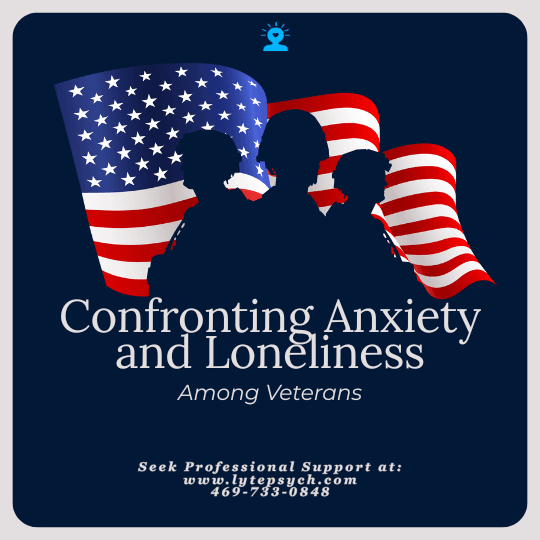Tue Nov 11 2025
Confronting Anxiety and Loneliness Among Veterans at Lyte Psychiatry (Affordable Therapist and Psychiatrist Near You) Dallas & Arlington, TX

Confronting Anxiety and Loneliness Among Veterans
at Lyte Psychiatry (Affordable Therapist and Psychiatrist Near You in Dallas & Arlington, TX)
Honoring Service, Understanding the Silent Battles
While many veterans transition successfully to civilian life, others face invisible wounds that make it difficult to feel at peace, even long after deployment. According to the U.S. Department of Veterans Affairs (VA), nearly 1 in 3 veterans experiences symptoms of anxiety, depression, or post-traumatic stress at some point in their lives.
At Lyte Psychiatry, serving Dallas and Arlington, TX, we’re deeply committed to helping veterans and their families get around these emotional challenges with compassion, respect, and evidence-based care.
1. The Hidden Impact of Military Life on Mental Health
A Culture of Strength and Silence
Service members are trained to be resilient and mission focused. While these traits are vital in the field, they can make it harder to seek help after returning home. Many veterans feel they must “tough it out,” suppressing their emotions instead of processing them.
This silence can deepen loneliness, anxiety, or post-traumatic stress, and may even strain family relationships.
Understanding the Roots of Anxiety and Isolation
The causes are often layered:
Transition stress: Adjusting from a structured military life to civilian unpredictability.
Trauma exposure: Combat, loss of comrades, or witnessing distressing events.
Social disconnection: Feeling misunderstood or disconnected from civilians who haven’t shared similar experiences.
Survivor’s guilt: Persistent self-blame or emotional numbness tied to past experiences.
2. Recognizing the Signs of Anxiety and Loneliness
Emotional Symptoms
Constant worry, tension, or irritability
Feeling on edge or restless
Guilt or shame related to past experiences
Difficulty trusting others
Physical Symptoms
Fatigue or trouble sleeping
Rapid heartbeat or shortness of breath
Muscle tension or headaches
Panic attacks or sudden feelings of fear
Behavioral Signs
Withdrawing from social contact
Avoiding crowds, public places, or reminders of service
Turning to alcohol or substances for relief
Difficulty maintaining work or family relationships
Recognizing these symptoms early is a crucial first step toward healing.
3. The Link Between Anxiety, Loneliness, and PTSD
For many veterans, anxiety and loneliness don’t exist in isolation they are often intertwined with Post-Traumatic Stress Disorder (PTSD). Flashbacks, hypervigilance, and avoidance behaviors can reinforce feelings of isolation, making social interaction seem unsafe or overwhelming.
When left untreated, these conditions can increase the risk of depression, relationship difficulties, and even suicidal thoughts. That’s why timely, compassionate care from trained professionals is so essential.
4. How Lyte Psychiatry Helps Veterans Reclaim Peace and Connection
At Lyte Psychiatry, our team provides a safe, judgment-free environment for veterans to share their experiences and rebuild emotional stability. We use a trauma informed approach, understanding that healing takes patience, trust, and personalized care.
Evidence Based Treatments for Veterans
We offer therapies proven to help with anxiety, trauma, and loneliness, including:
Cognitive Behavioral Therapy (CBT): Helps reframe negative thoughts and reduce anxiety triggers.
Eye Movement Desensitization and Reprocessing (EMDR): Assists in processing traumatic memories safely.
Mindfulness-Based Stress Reduction (MBSR): Promotes calm, focus, and body mind awareness.
Medication Management: When appropriate, psychiatric support can help regulate mood and anxiety.
Holistic, Veteran-Centered Care: Our clinicians consider every aspect of your well-being emotional, physical, and social. We also help veterans rebuild structure and purpose through coping strategies, communication skills, and community engagement.
Accessible Support: Lyte Psychiatry proudly offers affordable mental health care, accepts most major insurances, and provides telehealth sessions for veterans across Dallas and Arlington, TX, ensuring flexibility for those balancing family, work, or recovery.
Healing from anxiety and loneliness isn’t about forgetting your past it’s about learning to live peacefully with it. Community and connection are powerful antidotes to isolation.
Whether through peer support, group therapy, or family counseling, opening up about your experiences can help restore a sense of belonging and purpose.
Reclaim Your Strength and Peace with Lyte Psychiatry and Schedule an Appointment Today (Affordable Therapist and Psychiatrist Near You)
You served with courage and you deserve compassionate, expert care that honors that same courage.
Reach out to Lyte Psychiatry today to schedule a confidential consultation. Together, we’ll help you transform anxiety into confidence and loneliness into connection one conversation at a time.
Frequently Asked Questions:
Q: Is anxiety common after military service?
A: Yes. Many veterans experience anxiety due to high-stress experiences, adjustment challenges, or trauma exposure during service.
Q: What if I’m not ready to talk about my experiences?
A: That’s okay. At Lyte Psychiatry, our clinicians meet you where you are — no pressure, no judgment. You set the pace.
Q: Can medication help with veteran-related anxiety or PTSD?
A: In some cases, yes. Medication can help manage symptoms while therapy addresses underlying causes. Our psychiatrists will guide you through safe, personalized options.
Q: Does Lyte Psychiatry work with veterans’ insurance?
A: We accept most major insurance plans and offer affordable self-pay options for veterans who may not have VA coverage.
Q: Are telehealth sessions available?
A: Absolutely. We provide secure virtual appointments to ensure convenient access to care, wherever you are.